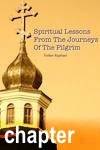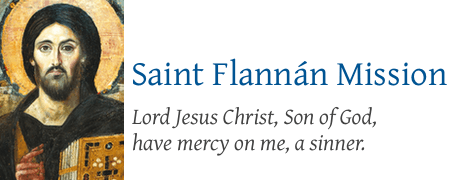 Lest we misjudge good people, let us remember the saints sometimes present guises out of true humility.
Lest we misjudge good people, let us remember the saints sometimes present guises out of true humility.
Dear beloved,
The pilgrim joined the judge’s family to the Divine Liturgy at the community church. The pilgrim was so moved that the family and the kids would kneel and pray, with tears of joy on their faces, whose radiance made the pilgrim cry with tears of joy too. The family showed their faith through actions, not just a mental agreement with the Truth (St James 2:14-19, Romans 10:10).
Every Divine Liturgy is our blessing to be able to partake in the Divine Nature. It is a unique Holy Mystery that allows us, the living, to partake in unified worship with the hosts and the departed, towards God. It is the central activity in the Church that unites all of us faithful. When we attend the Divine Liturgy, it gives us a foretaste of heaven, and makes us feel infinitely small and transparent before God, and yet, powerfully warm, like a cuddled baby, in the cradle of God (2 Thessalonians 2:14).
When we attend the Liturgy of Preparation, we are made aware of the entry prayers, we venerate the icons of our Lord and Christ and our Holy Theotokos. Our priests are vested with the solemnity of understanding God’s grace and mercy of using humble laborers to serve His Divine purpose and celebration.
And when we partake in the Liturgy of the Word, we remember the importance of the Holy Word of God, and we remember Christ Himself. We pray the litanies, Psalms, Beatitudes, Trisagion, Epistles, Gospels, and listen to the Homily of the day. It is a celebration of our faith in God, a celebration of the Word made known to us through Christ and His apostles, and a celebration of the Divine inspiration through the Holy Spirit.
When we attend, with fear and trembling, and with much longing, the Liturgy of the Faithful, we profess our faith universally through the Creed, Sursum Corda, commemoration of the saints, the Lord’s Prayer, and we partake in receiving the Holy Communion of the Body and Blood of Christ, a Holy Mystery that we are blessed to receive (St Matthew 26:26-28).
After the Liturgy, the pilgrim was shocked that the priest said that he did not have time for reading the saints’ writings, due to his many duties. However, the judge’s wife told the pilgrim that he should not misinterpret the priest’s true humility as one of nonchalance. The pilgrim humbly reflected on the sayings of Nikitas Stethatos in the Philokalia, that a person is measured from the interior soul, and not what is manifested on the outside, or said. The pilgrim further reflected that the truly prayerful and faithful Christian, especially one who has genuine inner prayer and love for others, would love all equally, saints and sinners alike. Just as many things grow in silence, the greatest of saints around us, may well be those who are meek, silent, and seemingly obscure (St James 3:2). Just as we need a silent heart to listen to the heartbeat of God, stop and listen quietly, and pray quietly, and we might just discover the subtle and gentle signs of God around us, and in the people around us (St Matthew 14:23).
Saint Dorotheus of Gaza once said, “Through the mercy of God, the little things done with humility will enable us to be found in the same place as the saints who have labored much and were true servants of God.”
The pilgrim also saw a blind beggar at Church, who prayed the Jesus Prayer unceasingly for a long time, despite his disability. The pilgrim also took to inner prayer, basking in the true joy and tranquility, inspired by the blind beggar’s faith. The blind beggar told the pilgrim he was once a tailor, who loved to pray the Jesus Prayer. However, his vocal prayers perturbed people around him, and so eventually the tailor prayed without moving his lips, letting the Jesus Prayer encircle silently in his heart instead. One day, the tailor became blind, but continued to pray from the heart, the Jesus Prayer.
When we are struck with calamities, or suffering challenges in life, do we relieve ourselves of the emotional and physical burdens and leave them with God, and brave on as Saint Paul admonished us to as soldiers or marathon runners? Do we lose our faith in difficulties and blame God, or do we see Divine reason and pray and trust Him all the more (1 Corinthians 10:13, Revelation 3:21)?
The pilgrim was grateful of the company of the blind beggar, and so both of them set off together, and the pilgrim read the Philokalia to the blind man along their journey, as they prayed together.
If we are truly blessed with faith, with the Word of God, with the many illuminations, do we keep them to ourselves? Or do we willingly share such inner joy with others who come to us? Even as we are unworthy sinners, perhaps we can pray unto God and ask our Lord for His mercy and grace to embrace us, to grant us the ability to share His truth and love with others. Our tongues are frail, our minds are feeble, and our spirits weak. But surely God has infinite wisdom, strength and love that can shine through us, His children (Hebrews 10:25)?
Let us pray:
“Lord Jesus Christ, Son of God, have mercy on me, a sinner.”
Book Index | Prev: Washing others’ feet | Next: Fruits of prayer
